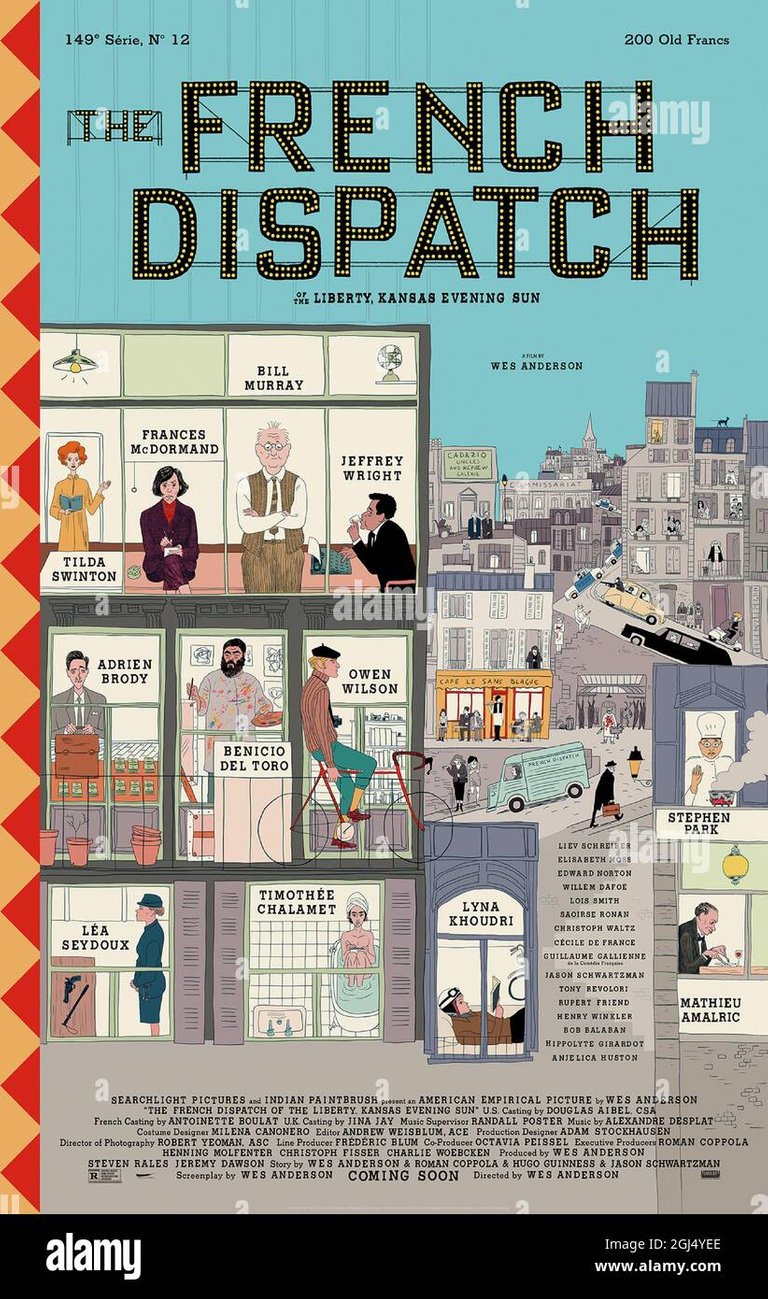I've always wanted to review books and scripts and movies but despite my constant desire to endeavour on this satisfactory but perilous journey, I never seem to have the stomach or fortitude to actually embark on it. Until now.
I could say a lot about the movie: The French Dispatch. The way the aspect of narration is employed or the fact that despite not always being in the picture, the narrator, whom is a part of the story and naturally would have employed a first person Point of View, ends up narrating the plot, the dialogue and even the settings to a Tee, despite not being in the vicinity. That was quite intrinsic in capturing and maintaining the viewer’s interest and curiosity.
I could talk about the overlapping colour or picture type used in the entire work to depict varying notions in the entire work.
The distinct switch of language in many occasions without remorse or any indication to the viewer was quite intriguing as it not only reminded the audience that the entire story occurred in France but also introduced an element of acute professionalism and intelligence.
A LITTLE SUMMARY OF THE WORK
For some who didn't quite get the work. The owner of a newspaper dies and wills that the corporation make a final print for the tabloid’s readers before the company be dismantled and it's assets sold off. He makes arrangements for severance package for workers, wishes that the newspaper’s subscribers be refunded for that edition and the rest fund is suppose to go to charity. This opens the movie and the incidents that happened thereafter are a number of features and columns written by writers and columnists of the newspaper.
Narrating everything that happened would be a bore, but all I can say is there were four stories weaved a little disjointedly to form the last print off the tabloid.
THE PRIVATE DINING ROOM OF THE POLICE COMMISSIONER.
They were all good stories, some funny and others quite artistic. I would however love to hint on the last story and particularly the dialogue between Nesscaffier, played by Stephen Park and Roebuck Wright, played by Jeffrey Wright.
Ennui: (SOFTLY) They had a flavor.
Journalist: I beg your pardon?
Ennui: The toxic salts in the radishes… they had a flavor.
Totally unfamiliar to me.
Like a bitter, moldy, peppery, spicy, oily kind of earth.
I never tasted that taste in my life.
Not entirely pleasant, extremely poisonous, but still, a new flavor.
That’s a rare thing at my age.
Journalist: I admire your bravery, Lieutenant.
Ennui: I’m not brave.
I just wasn’t in the mood to be a disappointment to everybody.
I’m a foreigner, you know.
Journalist: This city is full of us, isn’t it?
I’m one myself.
Ennui: Seeking something missing.
Missing something left behind.
Man: Maybe with good luck, we’ll find what eluded us in the places we once called home.
Nesscaffier is a chef Japanese and police kidnap investigator, who wears a chef's clothe with the name tag, Commissariat Ennui and works for the French police chief and Roebuck Wright is an African-American working as a food journalist for the French tabloid.
That little dialogue hinted a little on racism and a cultural difference with those whom they interact with in their daily lives. It was said that both had to go the extra mile to do things, others of the area wouldn't, simply because of their skin colour.
Ennui took a poison in a bid to protect his boss’s son because he felt he had to go the extra mile because he was a foreigner. And the saddest part of it was this subtle hint about racism was also cut out of the entirety of the print.
It was a wonderful movie because while a gave a little bit of history, it also, in a glamorous and colourful style, touched on numerous issues plaguing society.
All this talk is just me trying to say I liked the movie that's all. Hahaha



